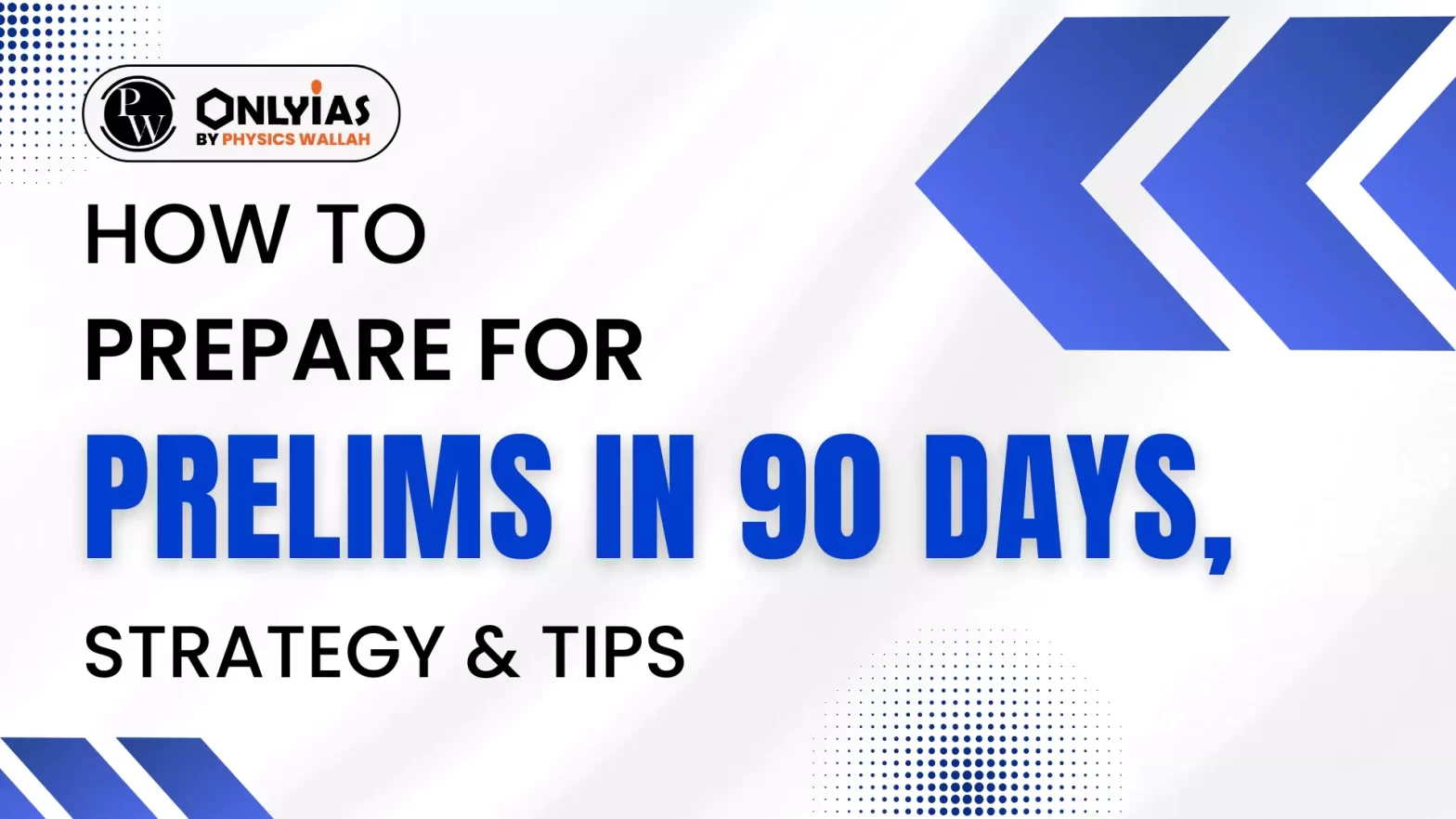How to Prepare for Prelims in 90 Days? You may question if you are starting from scratch. Starting the path towards the UPSC preliminary exam needs methodical preparation and meticulous planning.

There are only ninety days left, and if you need a detailed study plan, this blog is for you. So it’s imperative to make a thorough study schedule that covers every topic in the syllabus. This all-inclusive approach will cover both GS Papers 1 and 2, incorporating current events, PYQs, revised NCERT books, and other necessary materials.
The Union Public Service Commission (UPSC) in India administers the UPSC Preliminary Examination, also known as the UPSC Prelims, which is the first phase of the Civil Services Examination. Candidates hoping to join the esteemed Indian Administrative Service (IAS), Indian Police Service (IPS), Indian Foreign Service (IFS), and other central services must pass this exam to be considered.
| Subject | Paper Nature | Exam Type | Number of Questions | Exam Duration | Marks |
| Paper 1 – General Studies | Merit Ranking | Objective | 100 | 2 Hours | 200 |
| Paper 2 –
General Studies 2 (CSAT) |
Qualifying | Objective | 80 | 2 Hours | 200 |
We gave careful consideration to How to Prepare for Prelims in 90 Days while creating the weekly schedule. Study sessions with a focus on current events, PYQs, and NCERT book revisions should take place every week:
The UPSC CSE Prelims is a difficult test that must be passed strategically. The SMARTER framework is a more intelligent framework that can assist you in reaching your goal. This structure will help you better prepare for your UPSC CSE preliminary. Thus, prepare yourself thoroughly to meet your objectives and ace the test.
S-Specific Objectives: Aim higher than just goodness. Establish precise, topic-specific objectives. Aim for a certain percentage of right answers in each part, and focus on becoming an expert on the difficult and recurring questions.
M-Measurable: Track your development using numbers; your practice exams serve as set builders. Keep track of how many of the questions in your practice papers you answered correctly. Establish a benchmark and assess your areas of weakness.
A-Achievable: Strive for greatness, but also maintain realism. It’s crucial to push yourself at every turn, so be sure your goals are realistic and within your reach.
R-Relevant: Set sensible priorities. Concentrate on important ideas and topics. Remind yourself not to become mired in unimportant minutiae.
T-Time Bound: Establish a schedule for your objectives. Establish due dates for finishing each topic or segment to make sure your planning is on schedule.
E-Evaluate: One of the most crucial things to do is keep track of your performance. You must evaluate your practice exam, identify your areas of weakness, and modify your study strategy accordingly.
R-Revise: The UPSC CSE Prelims in 60 Days allows you to assess your performance and take appropriate action. Success in the exam depends on revision.
Students who prepare for the UPSC preliminary exam got the solution for How to Prepare for Prelims in 90 Days. An organized 90-day prelims schedule that includes PYQ practice, current affairs integration, NCERT book revisions, and other necessary materials is given in this blog. Through meticulous adherence to this all-encompassing plan, candidates can optimize their chances of passing this demanding test.
Enhance your UPSC preparation by joining the top courses from Physics Wallah! Enroll now!
| Must Read | |
| NCERT Notes For UPSC | UPSC Daily Current Affairs |
| UPSC Blogs | UPSC Daily Editorials |
| Daily Current Affairs Quiz | Daily Main Answer Writing |
| UPSC Mains Previous Year Papers | UPSC Test Series 2024 |
Make sure you have a fundamental foundation in every subject while concentrating on high-yield topics and areas of personal interest. NCERT books are fundamental sources for thorough coverage of prelims exam.
PYQs are incredibly helpful for preparation as they offer insight into the exam style, question types, and degree of difficulty. They also help with self-evaluation and pinpointing areas that require development.
NCERT books provide an organized method for teaching core ideas in a variety of areas. Use them to gain a thorough understanding and make revisions; add more resources as necessary.
Since current events mirror the dynamic character of the test, they are essential. Combining current affairs with static courses improves comprehension and applicability. It also guarantees comprehensive preparation.
Establish attainable objectives, keep an optimistic outlook, and acknowledge minor accomplishments along the way. Recall your long-term goals and maintain your perspective while seeking help from study groups and inspirational IAS officers.
<div class="new-fform">
</div>
